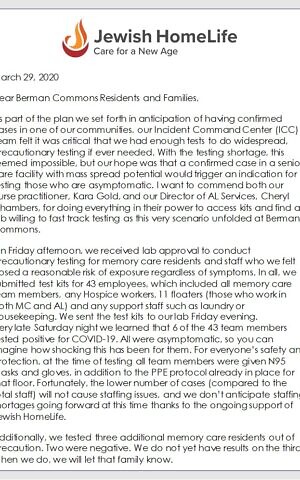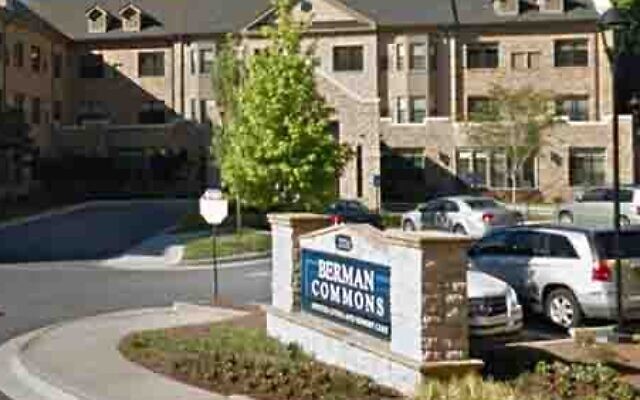Six Berman Commons Employees Test Positive for COVID-19 Coronavirus
After four memory care residents tested positive, employees working with that unit were tested as a precaution. Positive results were a shock.
Dave Schechter is a veteran journalist whose career includes writing and producing reports from Israel and elsewhere in the Middle East.
Six employees of the Berman Commons assisted-living residence have tested positive for the COVID-19 coronavirus, according to a letter sent Sunday, March 29, to residents and their families by Jewish HomeLife, which operates the Dunwoody facility.
This comes a couple of days after four residents of the Berman Commons memory unit tested positive for the potentially deadly virus.

The letter from Harley Tabak, president and CEO, and Jeff Gopen, the chief operating officer, said that the six were among 43 employees tested on Friday, March 27, as a precaution.
Berman Commons has 110 employees. The employees tested March 27 included all staff working in the memory care unit, staff working in the hospice unit, 11 “floaters” who work in both the memory care and assisted-living wings of Berman Commons, and support staff, such as those working in the laundry or housekeeping.
As a further precaution, three additional residents of the memory care unit were tested on March 27. Two of those tests returned negative and, as of the evening of March 29, the result on the third was not known.
The tests were sent to a lab the evening of March 27 and the six positive results that came back late the night of Saturday, March 28, on the six employees were a surprise. “All were asymptomatic, so you can imagine how shocking this has been for them,” the letter from Tabak and Gopen said.
When they report for work, Jewish HomeLife employees are asked a series of screening questions and have their temperature taken, and the temperatures are tracked to watch for any elevated temperature. “We’ve been ahead of the game on a lot of this,” Bayer said March 29, noting that Jewish HomeLife began barring visitors as a precaution ahead of many facilities. “Even with that and even with all the screening we still had cases.”
On Thursday, March 26, an employee who worked in the memory care unit on weekends — and had not been in the building the previous 11 days — called to say that she had tested positive for COVID-19. At the time, five residents of the memory unit already had been tested after developing elevated temperatures, a symptom of COVID-19. Four of those tests came back positive.
Berman Commons has a 32-unit memory care unit and 58 assisted-living apartments.

“Fortunately, the lower number of cases (compared to the total staff) will not cause staffing issues, and we don’t anticipate staffing shortages going forward at this time thanks to the ongoing support of Jewish HomeLife,” Tabak and Gopen said in their letter. “We are choosing to be grateful at a time when many are searching for answers or assigning blame. We are better able than many organizations to know who is positive before they even have symptoms because of our access to a lab with prompt testing capabilities.”
Additionally, on March 28, Dr. Kathleen E. Toomey, commissioner of the Georgia Department of Health, sent operators of long-term care facilities statewide a directive on measures that “should be implemented in ALL long-term care facilities throughout Georgia, regardless of if you have increased respiratory illness or confirmed cases of COVID-19 in your facility, and regardless of the number of persons diagnosed with COVID-19 in your immediate area.” Most of these either already were or have been put into effect at the elder-care facilities that Jewish HomeLife operates at its Howell Mill campus in Atlanta, in Dunwoody, and in Johns Creek.

In their March 29 letter to Berman Commons families and residents, Tabak and Gopen reiterated measures that went into effect after the initial set of COVID-19 cases were confirmed in the memory unit. Though there have been no suspected or confirmed cases in the assisted-living wing, “we have implemented policies so the entire community will be treated as if there has been exposure, including isolating all residents in their apartments and using proper PPE [personal protective equipment] as appropriate,” their letter said.
“All MC [memory care] staff are using N95 masks, gowns, gloves and if necessary, shields, to care for all residents, regardless of diagnoses,” the letter said.
“All team members will use gloves and masks when caring for all residents,” the type of mask and other protective equipment depending on the individual resident. “For asymptomatic residents in assisted living, we will follow the current CDC guidelines indicating that a surgical mask is appropriate. Anyone who is in direct contact (caregiver, dining, etc.) with someone showing symptoms or has a suspected or confirmed case will use N95 masks and other appropriate PPE,” the letter said.
The families of Berman Commons residents already had been barred from the facility.
“We will no longer allow private duty sitters who see other clients outside of Berman Commons. If our resident is their only client, we will allow them to continue provided they pass through our screening process,” the letter said. “We have already reduced Hospice visits, and will only allow limited family during the active dying process if they clear screening and wear gloves and masks.”
Residents of the Berman Commons assisted-living wing were directed March 27 to remain in their apartments. Communal dining was halted, and meals have been delivered to individual rooms.
Dining staff will wear protective equipment in the memory care unit. “The caregivers will actually serve and deliver to individual apartments. In Assisted Living, dining staff will deliver meals to resident rooms, wearing appropriate mask (or other PPE if indicated), and use proper hand hygiene plus re-glove between each apartment,” the letter said.
“We believe that testing is a critical part of prevention,” Tabak told the AJT on March 29.
In their letter, Tabak and Gopen praised Jewish HomeLife nurse practitioner Kara Gold and the JHL’s director of assisted-living services, Cheryl Chambers, for tracking down the necessary testing kits at a time when a shortage has made the kits an in-demand item throughout the state, and for identifying a lab “willing to fast track testing as this very scenario unfolded at Berman Commons.”
“We have been transparent with you since the beginning, and will continue to do so throughout this crisis. We appreciate your patience and understanding,” Tabak and Gopen said in their March 29 letter, adding that a dedicated email address had been created to answer non-emergency questions about how COVID-19 is impacting Berman Commons.




comments